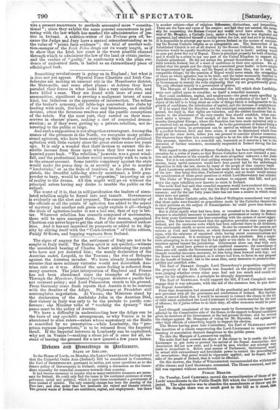The signs of augury for the settlement of Italy are
not to be sought in Italy itself. The Italian spirit is not quelled,—witness the unsubdued bearing of Charles Albert addressing the people who have not yet deserted him ; the manly declaration of the Austrian cadet, Leopold, to the Tuscans ; the rise of Bologna against the Austrian invader. We have already hazarded the surmise that mere military victories would not reestablish Aus- trian rule as it was. Abroad the same feeling is reflected from many quarters. The joint interposition of England and France has not been abandoned since the triumphs of Radetzky. Through the Moniteur, General Cavaignac declares a pacific but not recreant policy; and Lord Palmerston stands to his ground. From Germany come fresh reports that Austria is to be content with the frontier of the Adige. Diplomacy at Frankfort still contemplates negotiation. At Vienna, the Ministers stand by the declaration of the Archduke John in the Austrian Diet, that victory in Italy was only to be the prelude to pacific con- ference: one Minister talks of "teaching the dynasty" that peace must be the policy of Austria. We have a difficulty in understanding how the Adige can be the basis of any equitable arrangement, or why Venice is to be abandoned to alien rulers—rulers whose supremacy on the Rialto is sanctified by no prescription—while Lombardy, the " pro- prium regnum imperatoris," is to be released from the Imperial thrall. If the Imperial interests in Lombardy can be capitalized, why not in Venice 9—making a clean job of it once for all, in- stead of leaving the ground for a new quarrel a few years hence.


























 Previous page
Previous page